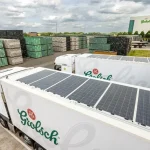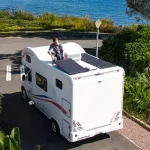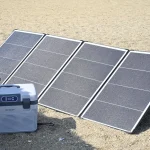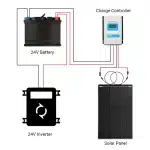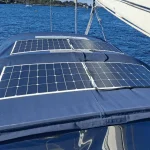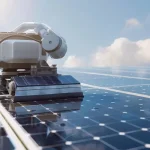Table of Contents
Camping is an enjoyable activity that allows us to escape the hustle and bustle of the city and connect with nature. However, when we venture into remote areas, staying connected and maintaining power becomes a challenge.
Fortunately, solar tents offer a revolutionary solution. These tents not only allow campers to generate power and stay connected even in the most remote locations, but they also combine traditional camping gear with cutting-edge technology to enhance comfort and convenience.
In this article, we will explore how solar tents work, the benefits they offer, and what to consider when choosing one. Together, we will discover how this technology is transforming our camping experience.
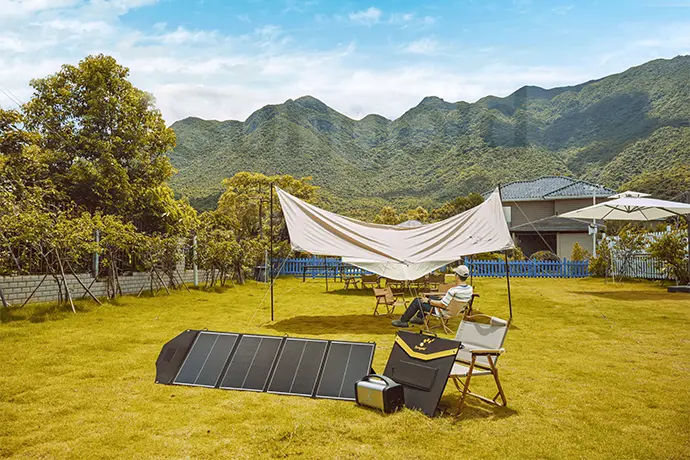
What is a solar tent?
A solar powered tent is an innovative piece of equipment that blends modern technology with the traditional camping experience. Designed with the idea of applying solar technology to camping life, this tent captures sunlight through built-in solar panels and converts it into electricity, which is stored in the accompanying batteries. In this way, even in a natural environment far from the city grid, campers can enjoy the convenience of electricity, such as charging cell phones, lamps or other small electronic devices. Solar tents not only provide an environmentally friendly energy solution that reduces camping’s dependence on non-renewable energy sources, but also greatly improves the comfort and convenience of camping. Whether it’s providing light for the solar powered tents for camping at night or charging photographic equipment and communication tools, solar tents ensure that campers don’t lose touch with the world while enjoying nature.
How does a solar powered tent work?
As mentioned above, a solar powered tent works because of the solar panels installed on top of it. These panels capture sunlight and convert it into electricity, and this converted energy can be used for a variety of purposes, including charging smartphones\solar powered fan for tent f and other small electronic devices, and even providing nighttime lighting and heating. The traditional way of dry camping has been quietly changing as technology advances, and we can now enjoy the convenience of off-grid power even when we are not connected to the grid. The solar panel on top of the tent absorbs sunlight during the daytime and converts solar energy into electricity which is then stored in the built-in battery. In this way, the solar powered camping tent is able to provide a constant source of power even in natural environments where there is no external power source. Depending on the weather conditions and the size of the panels, solar powered tents can produce varying amounts of electricity. Specialized charging docks are also built into some solar tent designs, making it easy for campers to charge their cell phones and other devices. Sometimes, it may be necessary to use the right charging cable to get the generated power from the batteries. Some solar powered tents also come with USB ports or AC outlets, allowing campers to directly charge their devices without the need to carry additional power banks or adapters. Another type of solar tent utilizes a technology that weaves solar cords into the tent fabric, obviating the need to secure solar panels at the top of the tent. This type of textile-based solar tent not only offers all the benefits of a traditional solar tent, but also has a sleeker look and is sometimes lighter in mass. If the solar tent is able to capture enough energy, it is even possible to use the central heating or cooling system built into the tent to create a more comfortable living environment. This means that while enjoying camping in the great outdoors, we can still enjoy the warmth and comfort similar to that of our homes. For the most part, solar tents are primarily used to power LED lights, and some designs are able to automatically utilize solar energy captured during the day to light the tent at night and charge basic electronic devices such as smartphones. This use of solar energy is not only environmentally friendly, but also greatly increases the convenience and comfort of camping.Solar Tent Pros and Cons
This type of tent utilizes solar panels to provide power to campers, whether for lighting, charging, or other electrical needs. Despite the many conveniences and environmental advantages that solar tents offer, it’s still important to understand the pros and cons before choosing one.Pros
- Convenience: solar powered tents have built-in solar panels, eliminating the need to find an external power source; simply plug your device into the tent’s integrated power outlet to charge it.
- Environmentally friendly: using a solar powered tent helps to reduce dependence on non-renewable resources and is friendly to the environment.
- Low Maintenance: Once a solar powered tent is purchased, there is little maintenance required other than regular cleaning of the solar panels and checking the converter and inverter to ensure proper functioning.
Disadvantages
- Price: due to the integrated solar technology, solar powered tent price are usually more expensive than traditional tents.
- Weather Dependency: The power output of a solar tent is significantly affected by the weather, with limited power production on cloudy or rainy days, which may not be able to meet all power needs.
- Weight: Solar powered tents are heavier than traditional tents due to the built-in solar panels, which may make it more difficult to carry and set up.


